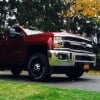- 0
2014 Sierra Denali 5.3L knocking & drive line slop in traffic
-
Recently Browsing 0 members
- No registered users viewing this page.
-
Forum Statistics
246k
Total Topics2.6m
Total Posts -
Member Statistics
-
Who's Online 3 Members, 0 Anonymous, 585 Guests (See full list)













Question
glocklt4
I have tried searching everywhere for someone else with the same issues as me, but not having much luck. And yes, I'm trying to get it back in the dealer but have been crazy busy and out of the country a lot. As someone who works on cars relatively frequently, I'm stumped.
So, 2014 Sierra Denali w/ 5.3L 12.5k miles. I have tried a broad range of 87 octane gasolines (Chevron, Exxon, Quicktrip, Kroger, RaceTrac, etc...) but continue to get significant knocking under load (3k+ rpm w/ 40%+ throttle I'd say). Even with 89oct I still get some, but not as much. 93oct is the only way to prevent it at all. When towing my boat it's worse due to even bigger load. This is unacceptable for a n/a engine...
I realize the main difference to this and any other vehicle I've worked on is direction injection, and I can't help but think there is something going on there. I brought this up with the dealer about 6mo ago when I took it in for a squeak on the exhaust plate actuator controlled by the Cyclinder Deactivation (also new to me), and of course the response was "fill it up with a different tank of gas". Well I've just been putting 89 in it since then to avoid most the knocking, but I'm tired of the additional cost I shouldn't have to be spending.
Other issue is that this transmission sucks in stop-go traffic. If you quickly (even midly) go from brake to gas, or even coasting to gas - there is major slop in the transmission or drive line to where 50% of the time there is a significant bang that is heard and felt as well. I don't think it's a transmission issue itself as it seems to shift quick and the bang is after the shift happens. I've been lucky to never have U-joints go out on a vehicle, but I'd think 6mo and 5k miles would have broken the rest of it if that was the problem.
I love this truck otherwise, but these two things are just unacceptable for a new luxury truck. Also I asked a buddy with a 2015 Sierra Denali and he doesn't have these issues at all, and even runs 87oct from Kroger (obviously not top quality gas, but I've traditionally used it for years now for $1/gal off everytime with fuel points).
Link to comment
Share on other sites
14 answers to this question
Recommended Posts
Archived
This topic is now archived and is closed to further replies.